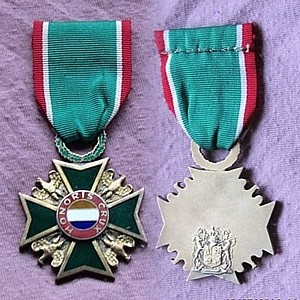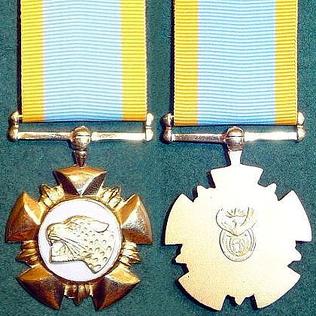
The Nkwe ya Gauta - Golden Leopard, post-nominal letters NG, is a military decoration for bravery which was instituted in 2003, to replace the Honoris Crux Gold (HCG). It is South Africa's highest military decoration for bravery.

The Nkwe ya Selefera - Silver Leopard, post-nominal letters NS, was instituted by the President of the Republic of South Africa on 16 April 2003 and came into effect on 27 April 2003. It is South Africa's second highest military decoration for bravery.

The Medalje vir Troue Diens - Medal for Loyal Service was instituted by the President of the Republic of South Africa on 16 April 2003 and came into effect on 27 April 2003. It can be awarded to all ranks whose character and conduct have been irreproachable and who have completed ten years of qualifying service.

The Louw Wepener Decoration, post-nominal letters LWD, is a military decoration for bravery which was instituted by the Union of South Africa in 1952. It was awarded to members of the South African Defence Force for acts of the most conspicuous courage or greatest heroism. The decoration was discontinued on 1 July 1975, when a new set of decorations and medals was instituted.
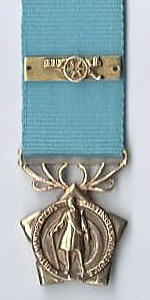
The Van Riebeeck Decoration, post-nominal letters DVR, is a South African military decoration for bravery which was instituted by the Union of South Africa in 1952. It was awarded to officers for distinguished service in the field.

The John Chard Decoration, post-nominal letters JCD, was a military long service decoration which was instituted by the Union of South Africa on 6 April 1952. It was awarded to members of the Citizen Force of the South African Defence Force for twenty years of efficient service and good conduct. Clasps could be awarded after thirty and forty years service respectively.
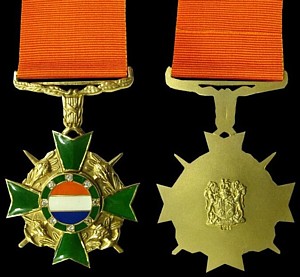
The Honoris Crux Diamond, post-nominal letters HCD, was a military decoration for bravery that was instituted by the Republic of South Africa on 1 July 1975, but never awarded. The decoration was intended for award to members of the South African Defence Force for death-defying heroic deeds of outstanding valour.

The Honoris Crux Gold, post-nominal letters HCG, is a South African military decoration for bravery which was instituted in 1975. It was awarded to members of the South African Defence Force for outstanding acts of bravery while in extreme danger. It was the second most senior in a set of four classes of Honoris Crux decorations which replaced the discontinued Honoris Crux of 1952.

The Honoris Crux Silver, post-nominal letters HCS, is a military decoration for bravery which was instituted by the Republic of South Africa on 1 July 1975. It was awarded to members of the South African Defence Force for exceptional acts of bravery while in great danger. The Honoris Crux Silver was the third most senior in a set of four classes of Honoris Crux decorations, which together replaced the discontinued Honoris Crux of 1952.

The Pro Merito Decoration, post-nominal letters PMD, is a military decoration for merit which was instituted by the Republic of South Africa on 1 July 1975. It was awarded to other ranks of the South African Defence Force for outstanding service of the highest order and utmost devotion to duty.

The Pro Virtute Decoration, post-nominal letters PVD, is a military decoration for bravery which was instituted by the Republic of South Africa in 1987. It was awarded to officers of the South African Defence Force for distinguished conduct and exceptional leadership during combat operations in the field.
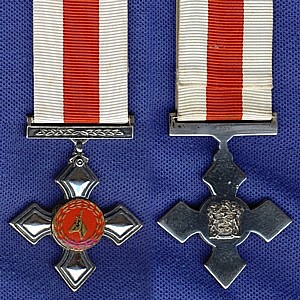
The Army Cross, post-nominal letters CM, is a military decoration which was instituted by the Republic of South Africa in 1987. It was awarded to members of the South African Army for bravery. The Army Cross was discontinued in 2003, but backdated awards can still be made for acts of bravery during this period.
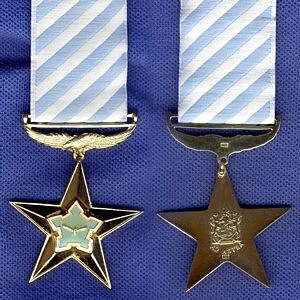
The Ad Astra Decoration, post-nominal letters AAD, was instituted by the Republic of South Africa in 1991, to reward South African Air Force aircrew members on board aircraft for excellent airmanship or outstanding ingenuity or skill during emergencies or critically unusual situations in the air. It was discontinued in 2003, but backdated awards can still be made for acts performed during the period in effect.

The Southern Cross Medal of 1975, post-nominal letters SM, is a military decoration which was instituted by the Republic of South Africa on 1 July 1975. It was awarded to officers of the South African Defence Force for exceptionally meritorious service and particular devotion to duty.

The Honoris Crux of 1975, post-nominal letters HC, is a military decoration for bravery which was instituted by the Republic of South Africa on 1 July 1975. The decoration was awarded to members of the South African Defence Force for bravery in dangerous circumstances. It was the junior in a set of four Honoris Crux decorations in four classes, which together replaced the discontinued Honoris Crux of 1952.
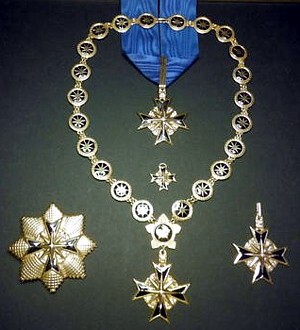
The Star of South Africa, Gold, post-nominal letters SSA, is the senior decoration of two military and five non-military classes of the Order of the Star of South Africa, a South African Order which was instituted in 1975, for award to general and flag officers of the South African Defence Force. The Order of the Star of South Africa was discontinued in 2002.

The Star of South Africa, Silver, post-nominal letters SSAS, was the second level decoration of two military and five non-military classes of the Order of the Star of South Africa, which was instituted by the Republic of South Africa on 1 July 1975. It was awarded to general and flag officers of the South African Defence Force for exceptionally meritorious service of major military significance. The Order of the Star of South Africa was discontinued in 2002.
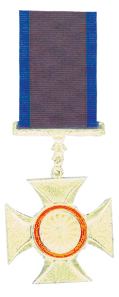
The Gallantry Cross, Gold was instituted by the President of the Republic of Venda in 1985, for award to all ranks for extreme courage or supreme bravery or valour beyond the normal call of duty.

The Gallantry Cross, Silver, post-nominal letters GCS, was instituted by the President of the Republic of Venda in 1985, for award to all ranks for courage or bravery or valour beyond the normal call of duty.
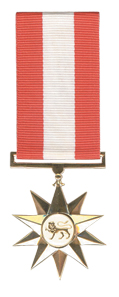
The Gold Star for Bravery, post-nominal letters GSB, was instituted by the President of the Republic of South Africa in April 1996. It was awarded to veteran cadres of the Azanian People's Liberation Army, the military wing of the Pan Africanist Congress, who had distinguished themselves during the "struggle" by performing acts of exceptional bravery in great danger.
